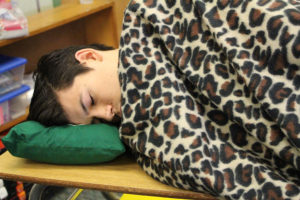Finishing strong: the effects of senioritis
May 30, 2018
Senioritis is a well-known and widespread feeling in high school. The seniors catch it, and everyone feels the effects of it. Senioritis occurs when seniors realize that they have gotten into college and passed for the school year, so they no longer feel like doing any work.
Underclassmen begin to feel it too. They slack off, which affects their GPA in following years. Everyone starts feeling tired and lazy at the end of the year.
Senior Jarred Curtis said, “I’d say [I have been feeling senioritis] since the end of the second marking period.”
It is most prevalent in the last two months of senior year, but for some, it has been a struggle since freshman year. The underclassmen see the senior begin to slack, and they lose their motivation too. When the talk of finals rolls around, brains start shutting down across the board.
Seniors do not want to do any of their work, but they do not realize that this is not the end. Life moves on, and many seniors must begin again in college. Teachers sense this lack of motivation and problem that is coming for the seniors.
Math teacher and senior class advisor David Bigelow said, “Definitely seniors are being affected by senioritis. Is senioritis a real thing? The effects of it are.”
Senior Nicholas Brewbaker said, “There doesn’t seem to be much point to school at this point at all, or basically this entire year.”
Senioritis has a large presence in schools as the year comes to a close. It brings students down but also gives them hope that the end is near. As the school year ends, students and teachers alike must find the motivation to finish the last few days.






























































































